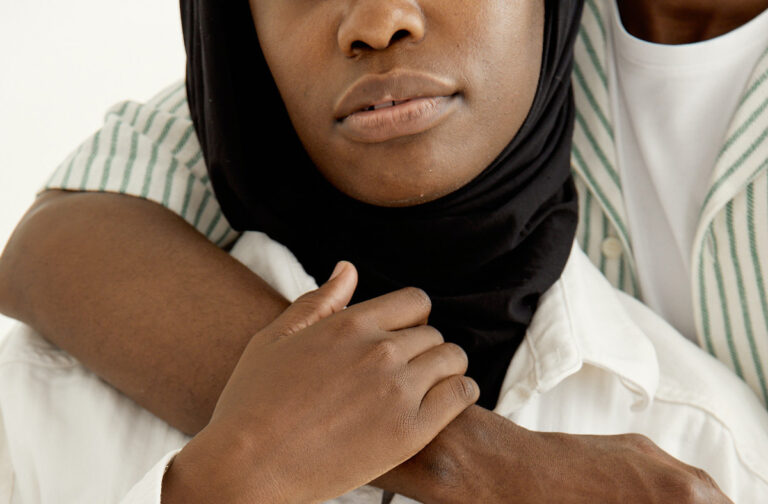Julia Fox can wear a trendy headscarf if she wants. Why can’t the same apply to Muslim women?
A few days ago, Vogue France published a photo on its Instagram page of actress and Ye’s new girlfriend Julia Fox wearing a black headscarf and sunglasses. The original caption read, “Yes to the headscarf! Swipe left for your recap of Julia Fox and Kanye West style journey at the haute couture shows in Paris this week.”
Outraged social media users were quick to point out the double standard of praising Fox for wearing a headscarf while Muslim women in France are being punished for it. “Many hijabi women have to wear a beanie or a turban instead of their hijab when they’re in France, meanwhile celebs and models wear it and suddenly it’s ‘high fashion’?” one commenter wrote. Vogue France has since removed the sentence referring to the headscarf.
Of course, the publication itself is not responsible for government policy. Nonetheless, such an insensitive statement highlights the hypocrisy present within the country’s overall socio-political culture where conversations around the hijab are seen as oppressive when it comes to Muslim women but high fashion on non-Muslims.
Ye also found himself under the spotlight when he wore a skin-tight black balaclava in Paris. The rapper’s infamous mask was previously praised as “Paris Fashion Week’s must-see accessory” when he wore one to Balenciaga’s Paris show last summer. His look was seen as “head-turning” and “daring.” In fact so daring, it’s illegal. But the difference is that while Ye is free to walk around France’s public streets and attend a prestigious event with his face fully covered, Muslim women who wear a niqab are punished with fines of up to €150 and have to attend “citizenship education” classes.
Since 2011, France has prohibited the “concealment of the face in public space.” So why is West not fined? And why has Fox not been slapped with a ticket that reads she is not wearing “an outfit respecting good morals and secularism,” as a Muslim woman wearing a burkini at a French beach was? Modest fashion, including headscarves, are complimented and even celebrated in the fashion world. But the reality for Muslim women is much different.
For decades, France has been using secularism as a socially acceptable front to legally discriminate against Muslims and violate religious freedom. In 2004, the country passed a law outlawing headscarves in primary and secondary schools. French senators voted to ban mothers who wear a hijab from attending school trips with their own children. In January 2022, they voted to ban hijabs in sports competitions. In more recent news, Macron’s party barred a Muslim candidate from running in a local election after she was photographed in a hijab for a campaign poster. The European Court of Justice ruled that EU businesses are permitted to sack women for wearing a hijab if they say they want “neutrality” in the workplace or to avoid “social disputes.”
In a world where Kim Kardashian’s black face-covering Balenciaga Met Gala outfit is “edgy” and “mysterious,” Muslim women are physically attacked and have their hijabs or veils yanked off them. We are seen as both an oppressed victim and a terror security threat, but models or celebrities who wear what we do are seen as neither. Instead, they are hailed as fashion icons. Whether the headscarf or a face covering is worn as a fashion statement or for religious reasons, the fact that it covers the hair or face remains the same. So what changed? The garment didn’t change, but the person wearing it did. These fashion shows and trends prove that modesty or certain garments are not the prime reason for triggering “social disputes,” rather it is the visibility of Muslim women that is the trigger.
Recently, headscarves and balaclavas became seen as quirky and cool fashion statements used for the expression of the self and individuality. But when Muslim women say the headscarf is a form of self-expression or a reflection of individual conviction, they aren’t believed, and even if it was, according to French politicians, that form of self-expression is unacceptable, at least on them. Banning hijabs, niqabs and burkinis is to supposedly restore the equality and dignity of women. Yet Muslim women aren’t given the dignity to make their own choices or even have the equal freedom to decide what they choose to wear.
Whenever the hijab is portrayed as being acceptable or represented on Muslim girls or women, there is outrage. When GAP released a back to school advert featuring a girl in a hijab, it was deemed “offensive” and said to go “against equal rights and secularism.” Decathlon abandoned its plans to sell a sports hijab in France following a backlash from politicians and the public. The company said store visitors in the country became violent.
Balenciaga’s headquarters are in France—there were no protests outside of the Paris HQ over Kim and Kanye’s all-black mask outfits. French politicians, who vowed to withdraw their support of GAP and Decathlon, remained silent about Fox wearing a headscarf and Balenciaga selling balaclavas in their country. You already guessed it, selective outrage is a recurrent theme here. No one demanded Fox be saved from oppression or protested that she was “brainwashed” into thinking that she made the choice to wear a headscarf. The garment clearly holds different connotations depending on who is wearing it.
Muslim women are forced to hide markers of their identity like the headscarf to be accepted and are pushed to the margins of public life or even removed, while they watch others who wear the same garment not only be accepted but glorified. Muslim women aren’t saying people shouldn’t wear whatever they want. What they are asking is, why can’t we?





